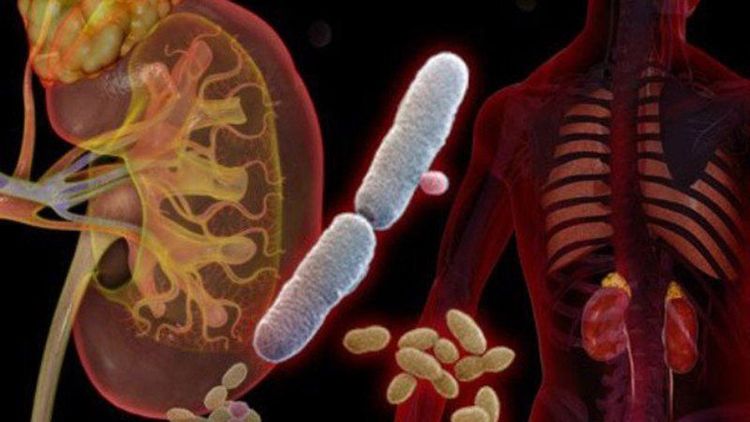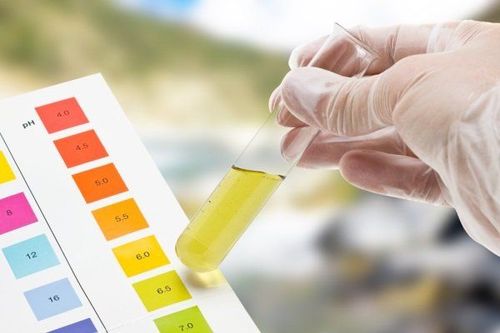This is an automatically translated article.
The article is professionally consulted by Master, Doctor Nguyen Thi Ngoc - General Internal Medicine - Endocrinology - Department of Examination & Internal Medicine - Vinmec Central Park International General Hospital. Doctor has more than 10 years of studying, researching and working in the field of endocrinology.Normal urine is clear, colorless or yellow. Change in urine color or dark urine due to many physiological, pathological or due to taking certain drugs.
1. What is dark urine?
Normal urine is light yellow to dark amber due to urochrome and the dilution or concentration of urine. Various pigments and compounds found in certain foods and medications can change the color of urine.
Pink or red urine color may be due to kidney problems or a urinary tract infection causing hematuria; Urine that is dark brown or tea color can be due to liver diseases ... Unusual changes in urine color are all dangerous signs of health. Abnormal urine color can be a sign of disease. Dark red or brown urine color is a telltale feature of porphyria, a rare genetic disorder of red blood cells.
2. What causes dark urine?
There are many causes of dark urine:
Alcaptonuria: This is a rare genetic disease caused by the accumulation of homogentisic acid in the body. The body's inability to convert tyrosine (an amino acid) into a derivative, eventually leading to alcaptonuria, which darkens urine, is caused by a lack of an important enzyme. Anemia: There are many different causes of anemia. Specifically, in the case of hemolytic anemia caused by the breakdown of red blood cells. This can lead to a change in urine color to red or dark with traces of blood in the urine samples. Porphyria: A rare inherited blood disease-related disorder that causes a defect in hemoglobin synthesis. Symptoms of this condition often include the following: abdominal pain, sensitivity to light, possibly seizures, and mental confusion. Urinary tract infections: Urinary tract infections can cause urine to turn an unusual color, possibly making it appear darker. Urinary tract infections are caused by bacterial or fungal infections and are more common in women than men.

Viêm đường tiết niệu là một trong số nguyên nhân khiến cho nước tiểu chuyển màu
Liver disease : If the urine is dark in color and the skin or eyes are yellow, it is a sign of liver disease such as viral hepatitis, alcoholic hepatitis, cirrhosis... Cirrhosis is a disease of the liver. hepatobiliary tract in which scar tissue begins to take over healthy liver parenchyma, rendering the liver unable to function properly. Dehydration: When the body is adequately hydrated, the urine is pale yellow or even clear to almost colorless. The more water the body loses, the darker the color of the urine. Signs of severe dehydration include feeling tired, dizzy or even blurred vision. Gallstones: Gallstones are usually formed from cholesterol in the gallbladder. Along with dark urine, you may also experience abdominal pain, fever, itchy skin, and jaundice. Bile duct obstruction: The bile ducts that carry bile into the intestines to aid in digestion. If these ducts become blocked, your urine will not only appear dark, but you will also experience digestive problems. Excessive heat: Excessive heat exposure (hot sun), prolonged exposure to the sun, or extreme heat can speed up water loss from the body. , leading to dark urine or other body conditions such as fainting. Chlamydia infection: Chlamydia is a sexually transmitted disease that requires immediate treatment to prevent other complications from developing, including dark urine.
Bladder stones : Bladder stones can damage the bladder or even lead to a urinary tract obstruction, which shows signs of dark urine. Acute pancreatitis: Inflammation of the pancreas leads to pain and swelling in the upper left side of the abdomen, along with nausea, belching, and dark urine. Due to food: Some foods after eating can change the color of urine. The addition of colorants like anthocyanin and curcumin in daily foods can also be the cause of dark urine. Drug causes: Certain chemicals found in common medications can contribute to dark urine. These include iodine, antimalarials, phenol poisoning, and methocarbamol. Some vitamin supplements can also lead to dark urine. Dark urine in the morning: The most common cause is lack of water in your body. During sleep, the body is not supplied with fluids, which can cause the urine to become thicker. So the first time you urinate in the morning you will notice a darker urine color and gradually return to normal as you drink water throughout the day. Dark urine in pregnancy: During pregnancy, dark urine can also be a result of the mother's body being dehydrated, especially because pregnant women need more fluids than non-pregnant women. pregnant. Dehydration can also be a sign of morning sickness and vomiting, common during pregnancy.

Nước tiểu sẫm màu cũng có thể do cơ thể người mẹ thiếu nước trong thai kỳ
3. Treatment of dark urine
As mentioned above, dark urine is a warning sign of many dangerous health problems. So, when you see dark urine, you can take the following steps:Review the foods you have eaten recently, what medicines you are taking in the treatment of the disease and whether you have any problems. How often do you drink water? Daily food, lack of water and medications you are taking are the 3 main common causes of dark urine and are also causes that you can deal with relatively easily on your own. Treatment for dark urine depends on the cause. All causes have specific treatments that a specialist will prescribe and explain to you. To prevent dark urine, you can do the following recommendations:
Rehydrate enough. A healthy lifestyle and preventing other causes can contribute to dark urine. Maintain a good diet, exercise regularly every day while reducing alcohol intake. You should see a doctor immediately if you experience any of the following:
You should see a doctor immediately if you notice blood in your urine as this could be a sign of cancer or urinary stones. If you're drinking enough water but the color of your urine is still dark, you should also see your doctor. If you experience pain or jaundice accompanied by dark urine, you should see your doctor immediately. Dark urine reflects your health status and is a sign of many dangerous diseases. As soon as the urine color is abnormal, you should go to a medical facility for an examination. You can go to Vinmec International General Hospital to do the necessary urine tests to find the cause early and have effective and timely treatment.
Urine test at Vinmec takes place very quickly, with accurate results, performed by a team of experienced, highly qualified doctors with modern equipment.
Please dial HOTLINE for more information or register for an appointment HERE. Download MyVinmec app to make appointments faster and to manage your bookings easily.













